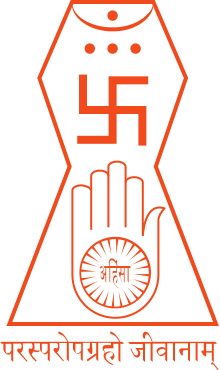Banarasidas
| Banarasidas | |
|---|---|
| Born |
1586 Jaunpur, Uttar Pradesh |
| Died |
1643 (aged 56–57) |
| Occupation | Businessman, Poet |
| Religion | Jainism |
| Parent(s) | Kharagsen (father) |
| Part of a series on |
| Jainism |
|---|
 |
|
Jain prayers |
|
Ethics |
|
Major figures |
|
Major sects |
|
Festivals |
|
Pilgrimages |
|
|
Banarasidas (Hindi: बनारसीदास) (b. Jaunpur 1586-1643) was a Shrimal Jain businessman and poet of Mughal India. He is known for his poetic autobiography - Ardhakathānaka, (The Half Story),[1] composed in Braj Bhasa, an early dialect of Hindi linked with the region around Mathura. It is the first autobiography written in an Indian language. At the time, he was living in Agra and was 55 years old - the "half" story refers to the Jain tradition, where a "full" lifespan is 110 years.
Life
Banarasidas was born in a Shrimal Jain family. His father Kharagsen was a jeweller in Jaunpur. He spent his childhood in Jaunpur but later shifted to Agra. He is one of the leading proponents of the Adyatma movement, which eventually led to the Terapanth sect of the Digambar Jains.
Banarasidas appears to have been a better poet than a businessman; at one stage he relates how after incurring several business losses, his wife gave him twenty rupees that she had saved up. At times a friend of the nawab of Jaunpur Chini Kilechkhan, at other times persecuted, he had to flee to other cities.
Despite the long life expectancy inherent in the title of his work Ardhakathānaka, Banarasidas died two years after writing it, in 1643.
Works
Banarasidas is known for his works, Moha Vivek Yuddha, Banārasi Nāmamāla (1613) Banārasivilāsa (1644), Samayasāra Nātaka (1636) and Ardhakathanaka (1641) in Braj Bhasa.
The Banārasi Nāmamāla is a lexicographic work based on Dhananjaya's Nāmamāla in Sanskrit.
The Banārasivilāsa is an anthology of his poetic works collected by Pandit Jagjivan. It was completed in 1644.
The Samayasāra Nātaka is a work on the Jain philosophy, largely based on Kundakunda's Samayasāra (a Digambara text), its Sanskrit commentary by Amritachandra and Hindi commentary by Rajamalla.
The Ardhakathānaka describes his transition from an unruly youth, to a religious realization by the time the work was composed. The work is notable for many details of life in Mughal times - Banarasidas lived during the reign of Akbar, Jahangir and Shahjahan.[2] He appears to have been an occasional chess partner of Emperor Shahjahan (this is not mentioned in the Ardhakathanaka though).
The following stanzas describe the effect of Akbar's sudden death in 1605 - the uncertainty of succession induced widespread fear among the wealthier classes:
ghar-ghar dar-dar kiye kapaaT,
haTavaanii nahi.n baithe haaT.
bhale vastra aru bhuushaNa bhale,
te sab gaaDhe dharatii tale.
ghar-ghar sabani visaahe shashhtra,
logan pahine moTe vastra.
u.nch niich kouu nahi.n pahichaan,
dhanii daridrii bhaye samaan.At all the houses, doors were kept closed,
merchants stopped sitting at the shops.
Nice clothes and ornaments were
all buried under the ground.
People started keeping their swords ready,
they started wearing coarse clothes.
You could not recognize the status of a person,
the rich and poor looked alike.
Recent interest
Pioneering work on Banarasi and his trio of works, Banarasi Vilasa, Samayasara Nataka and Ardhakathanaka was carried out by Pandit Nathuram Premi in the early decades of the 20th Century. Since then, only Mukund Lath's translation, Half a Tale was published in 1981.
Recent interest in the works of Banarasi, particularly in his Ardhakathanaka are a direct result of the abiding interest of two scholars.
Prof. Dr Nalini Balbir of Sorbonne Institute of France encouraged her student Jérôme Petit to work on Banarasi for his Ph.D. Petit has now completed the study and a French translation of the Ardhakathanaka.
Prof. Dr Rupert Snell, of University of Texas at Austin, USA not only wrote an article on Banarasi, but also encouraged Dr Chloe Martinez of Santa Barbara to work on Banarasi.
Rohini Chowdhury's Hindi translation of Banarasidas' Ardhakathanaka has been published by Penguin Books India, 2007. ISBN 978-0-14-310056-0. A new English translation by Chowdhury has been published by Penguin Classics in 2009 [ISBN 978-0143100546]. Chowdhury's translations were inspired by Dr Rupert Snell, he also wrote the Introduction to the work.
See also
References
- ↑ Ardhakathanaka: Half a Tale by Mukund Lath (Translator), Rupa & Co, 2005
- ↑ http://www.sub.uni-goettingen.de/ebene_1/fiindolo/gretil/3_nia/hindi/bardhkpu.htm Banarasidasa Ardhakathanaka, Based on the ed. by Nathuram Premi, Bombay, Hindi Grantha Ratnakara, 1957
Further reading
- Rupert Snell, Confessions of a 17th-Century Jain Merchant: The Ardhakathanak of Banrasidas, South Asia Research, Vol. 25, No. 1, 79-104 (2005)